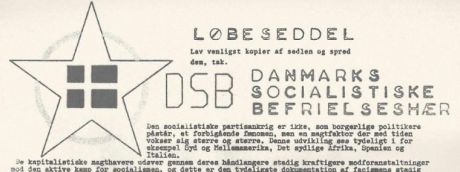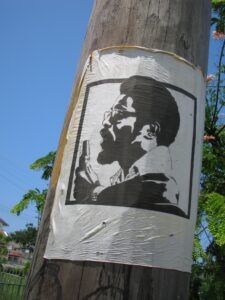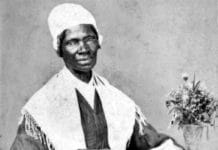
Socialistisk Biblioteks Tidslinje med links til begivenheder og personer i 1980.
Se også Index over personer, organisationer/partier og værker (som bøger, malerier, mm.), steder, begivenheder, mv., der er omtalt på hele Tidslinjen, titler og indhold på emnelisterne osv.
27. januar 1980
Gruppen Danmarks Socialistiske Befrielseshær (DSB) udfører brandattentat mod varehuset Føtex på Frederiks Allé i Århus.
Senere i 1980 udføres flere aktioner af de århusianske aktivistgrupper Statsfjenderne/Saftevandsfronten.

I alt forekommer der i Århusområdet 32 hærværksaktioner på 8 mdr. i 1980.
Se:
Danmarks Socialistiske Befrielseshær (Wikipedia.dk)
Operaton Zeus (pdf) (PET-kommissionens beretning, bd. 12, s.46-78) (Justitsministeriet, 2009; online på Internet Archive)
Dengang jeg fik en terrorist som nabo. Af Anders-Peter Mathiasen (Information.dk, 6. april 2012)
Se også:
Det glade anarki – og statens provokationer. Af Tom Vilmer Paamand (Fred.dk, august 2009)
Se på Socialistisk Bibliotek:
Linksamlingen: Blekingegade-sagen, se afsnittet om PET Kommissionen
18. marts 1980
Socialpsykolog og psykoanalytiker Erich Fromm dør i Muralto, Svejts. (Født 23. marts 1900 i Frankfurt am Main i Tyskland).
Links:
- Erich Fromm (Denstoredanske)
- Erich Fromm (WikiTrans). Bla. med bibliografi med danske titler.
- Erich From (Wikipedia.no). Norsk bokmål-artikel.
- Erich Fromm (Wikipedia.org). Længere artikel.
- Erich Fromm Archive 1900-1980 (Marxists Internet Archive)
- Erich Fromm. By Jairus Banaji (Historical Materialism; online at Internet Archive)
Psychoanalysis for collective liberation. By Javier Sethness (New Politics, Issue 72, Winter 2022). Review of Kieran Durkin and Joan Braune, eds., Erich Fromm’s Critical Theory: Hope, Humanism, and the Future (Bloomsbury Academic, 2020, 248 p.). “Whereas [the book] is undeniably an important intervention in psychoanalytic, humanist, and radical theory, some caution is needed with an expressly Marxist interpretation of Fromm’s lifework.”
Erich Fromm, escape fromf freedom & pseudo-populist authoritarianism. By Scott Remer (New Politics, Issue 72, Winter 2022). “Remer analyzes far-right politics in light of Erich Fromm’s psychoanalytic theory.”
Erich Fromm and the mass psychology of Fascism. By Daniel Finn (Jacobin, April 16, 2021). An interview with Kieran Durkin: “The German socialist philosopher Erich Fromm sought to explain the social psychology of right-wing authoritarianism after the Nazis drove him into exile. His work is full of valuable insights that can inform struggles for political and economic freedom today.”
Life Itself Is an Art: The Life and Work of Erich Fromm. By Jarno Hietalahti (Marx & Philosophy Review of Books, 1 February 2020). Review of Rainer Funk’s book (Bloomsbury, 2019, 208 p.). “In this work Funk gives an introductory view of Fromm’s psychoanalytic thinking.”
Between Marx and Freud: Erich Fromm revisited. By Ian Ferguson (International Socialism, Issue 149, Winter 2016, p.151-174). “More than three decades after his death, the ideas of Erich Fromm are enjoying something of an intellectual renaissance.”
See also Sabby Sagall: Erich Fromm and social character: A reply to Iain Ferguson (International Socialism, Issue 151, Summer 2016, p.185-191)
Life and work of Erich Fromm. By Rainer Funk (Logos: A Journal of Modern Society & Culture, Vol.6, No.3, Summer 2007; online at Internet Archive). “As one surveys Fromm’s literary output, one is struck by the variety and breadth of his interests and research.”
Thinking about Fromm and Marxism. By Kevin B. Anderson (Logos: A Journal of Modern Society & Culture, Vol.6, No.3, Summer 2007; online at Internet Archive). “Below, I reflect on some aspects of Fromm’s relation to Marxism, keeping these recent discussions in mind.”
On the anniversary of the birth of Erich Fromm. By Raya Dunayevskaya (News & Letters, April 1980; online at Marxists Internet Archive). “As against the movement away from Marx that he sensed in the Frankfurt School, he himself tried in every possible way to disseminate Marxist-Humanism into all fields, including his own-psychoanalysis.”
Fromm’s sane society. By Paul Mattick (Western Socialist, July-August 1956; online at Marxists Internet Archive). “In Fromm’s society of abundance, the workers’ problems are no longer related to the control of capital but merely to its co-determination.”
1. april 1980
Einstürzende Neubauten (EN) spillede deres første koncert på Moon i Berlin.
Se:
Einstützende Neubauten (eget site)
Se på Socialistisk Bibliotek:
Emnelisten: Einstürzende Neubauten
15. april 1980
Den franske venstrefløjsfilosof Jean-Paul Sartre dør (født 21. juni 1905). Sartre afslog Nobelprisen i litteratur 1964.
Nekrolog:
“Sartre: he missed the boat but kept on swimming”. By Ian Birchall (Socialist Review, Issue 5, 19 May 1980).
Se på Socialistisk Bibliotek:
Personlisten Jean-Paul Sartre
3. maj 1980
Politiet stormer byggelegepladsen Byggeren på Nørrebro.
Se:
Byggeren (Wikipedia.dk)
Byggeren (Leksikon.org)
Slaget om Byggeren april/maj 1980. Af Alfred Lang (Autonom Infoservice, 24. april 2010)
25 år efter: Byggeren overgav sig aldrig. Af Per Bregengaard (Modkraft.dk, 18. april 2005)
Kampen om Byggeren på Nørrebro 1980 (pdf). Af Søren Dyck-Madsen (Folkets Hus 1980, webudgave 1984, 96 sider)
Se også:
Venstresocialisterne – en parlamentarisk succeshistorie (Modkraft.dk/Kontradoxa, 20. januar 2016). Boguddrag fra Stig Hegn: Et herligt liv: en ungdom i VS og afdelingen i Esbjerg (Solidaritet, 2015)
Gadekampens deja vu. Af Allan Mylius Thomsen (Modkraft.dk/Kontradoxa, 8. april 2008)
Sangen om Byggeren (1980). Diasshow med billeder fra kampen om Firkantens byggelegeplads på Nørrebro. (YouTube.com; 3:40)
4. maj 1980
Jugoslaviens præsident (1892-1980) Tito dør.
Se:
- Tito (Josip Broz) (Leksikon.org).
- Josip Broz Tito (Denstoredanske.dk).
- Josip Broz Tito (Marxists Internet Archive). Biography + documents.
Titoism and Independent Socialism. By Hal Draper (Labor Action, December 1949–January 1950).
Litteratur:
8. juni 1980
Den tyske skuespiller og sanger Ernst Busch dør i Bernburg (DDR). Født i Kiel 22. januar 1900, se denne)
13. juni 1980
Afrika-historikeren Walter Rodney (født 23.3.1942, Georgetown, Guyana), forfatter til How Europe Underdeveloped Africa og stifter af oppositionspartiet Working Peoples Alliance (WPA), myrdes ved bombeattentat i Georgestown.

Biografier:
- Walter Rodney (1942-1980) (Marxists Internet Archive). Biografi + tekster af Rodney.
- Walter Rodney (Wikipedia.org)
- Walter Rodney: A biography (Guyanacaribbeanpolitics.com; online at Internet Archive)
- Walter Rodney Foundation (site). With Bibliography etc.
-
Walter Rodney’s Legacy (ROAPE). With articles 2018-2022.
Artikler:
Walter Rodney: a revolutionary for our times (Tempest, 1 April 2025). “Robert Cuffy and Leo Zeilig examine the revolutionary legacy of Walter Rodney, casting light on his break with state socialism and his embrace of working-class struggles from below.”
Decolonial Marxism: Essays from the Pan-African Revolution. By Viswesh Rammohan (Marx & Philosophy Review of Books, 3 January 2023). Review of Walter Rodney’s book (Verso, 2022, 336 p.). “Rodney’s book is a compilation of previously unbound essays, which span a vast range of topics. The book consists of a perfect mix of theoretical insights and praxis that Rodney has advocated, a trend common in all his works.”
Walter Rodney – A Revolutionary for Our Time. By Chaitram Aklu (ROAPE, July 5, 2022). Review of Leo Zelig’s book (Haymarket, 2022, 254 p.). “He argues that Zeilig’s extensive research, drawn from primary sources, provides a brilliant insight into the life and work of Rodney. Aklu also shares his own short eyewitness account of events surrounding Rodney’s tragic assassination in the opening sentences.” See also review by Joe Moore (Irish Marxist Review, Vol.11, No.34, December 2022, p.89-91) + review by Rachel Iboraii (RS21,
A Rebel’s Guide to Walter Rodney (Tempest, July 22, 2022). “Chinedu Chukwudinma gave the following kick-off presentation to a Tempest panel event … Walter Rodney is one of the most brilliant revolutionaries of the last century. But he’s also one of the most underrated and understudied, especially if you compare him to the likes of Malcolm X, Angela Davis, or Franz Fanon.” See Anyanwu L.’s review of Chinedu Chukwudinma’s book (Bookmarks, 2022, 74 p.): The life and politics of Walter Rodney (Tempest, March 23, 2023).
The Walter Rodney murder mystery in Guyana 40 years later. By Mary E. Curry (National Security Archive, J). “Documents chart U.S. Embassy’s effort to answer questions about the 1980 death of an acclaimed scholar and political activist. Update: Guyana National Assembly resolution in August 2021 affirms Burnham government responsibility.”
Walter Rodney’s legacy (Review of African Political Economy, 2018-2021). Theme with articles by Jesse Benjamin, Katie Barker, Walter Daum, Cecil Gutzmore, David Seddon, Andy Higginbottom, Chinedu Chukwudinma, Leo Zeilig, Anne Braithwaite, Jesse Benjamin, Katie Barker and Martin Empson.
Walter Rodney’s lost book: One Hundred Years of Development in Africa. By Leo Zeilig (Liberated Texts, September 13, 2021). “One of the most astonishing books that Walter Rodney … ever wrote was published several years after he was assassinated on 13 June 1980. The story of this book and how it came to be published is almost as remarkable as the life of the revolutionary himself.”
Walter Rodney: Marxist, Pan-African, organic intellectual (Counterfire, October 23, 2020). “Sean Ledwith recounts the socialist revolutionary Walter Rodney’s many accomplishments and intellectual prowess.”
The historical retrieval and controversy of Walter Rodney’s Russian Revolution. By Matthew Quest (New Politics, Issue 68, Winter 2020). “The posthumous publication of Walter Rodney’s book on the historiography of the Russian Revolution is a remarkable accomplishment of historical retrieval, and it provides us with an opportunity to look more deeply into Rodney’s relationship to Marxism, Soviet Communism, and Maoism and post-colonial politics.”
Walter Rodney: Pan-Afrikanism, Marxism and the next generation. By Kevin Okoth (Verso, Blog, 24 April 2019). “Celebrating the work and legacy of radical Guyanese historian and revolutionary Walter Rodney.”
Revolution and the Global South. By Chin Chukwudinma (International Socialism, Issue 162, Spring 2019). Review of Walter Rodney, The Russian Revolution: A View from the Third World. Edited by Jesse Benjamin and Robin D.G. Kelley and foreword by Vijay Prashad (Verso, 2018, 336 p.). “Rodney’s unfinished book presents a remarkable interpretation of the Russian Revolution, different from those produced in the West.”
Walter Rodney’s legacy (Verso, Blog, 24 April 2019). “In this striking new foreword – extracted in full here – Angela Davis considers the legacy of Walter Rodney and his seminal How Europe Underdeveloped Africa.”
Walter Rodney and the question of power (Verso, Blog, 24 April 2019). “In this essay, originally published by Race Today in 1983, CLR James discusses Rodney’s work in relation to the revolutionary seizure of power.”
The persisting relevance of Walter Rodney’s “How Europe Underdeveloped Africa”. By Giovanni Vimercati (Los Angeles Review of Books, November 27, 2018). “Rodney notes that while impossible to calculate the impact of the slave trade first, and colonialism after, has virtually deprived Africa of any developmental opportunity, condemning it to a subsidiary role.”
Potency of Walter Rodney’s ideas 38 years after assassination. By Wazir Mohamed (Pambazuka News, June 15, 2018; online at MR Online). “Thirty-eight years have passed since Walter Rodney was assassinated in Guyana on 13 June 1980 in Georgetown, Guyana’s capital city, but his legacy lives on beyond his home-country.”
How Europe Underdeveloped Africa: The legacy of Walter Rodney. By Lee Wengraf (Review of African Political Economy, June 16, 2017). “She writes how he was influenced by Marxist ideas and remains central to the Pan-Africanist canon for many on the left.”
Walter Rodney: a revolutionary Caribbean hurricane. By Susan Jappie (A World to Win, 11 March 2013). Review of Clairmont Chung (ed.), Walter A. Rodney: a promise of revolution (Monthly Review Press, 2012). “Walter Rodney was an exceptional man. He was not only a leading scholar and historian, but a Marxist revolutionary who sought to unite people in Jamaica and Guyana. A new book of essays pays tribute.”
Remembering Walter Rodney. By Issa G. Shivji (Monthly Review, Vol.64, No.7, December 2012). “Whenever we had differences we met internally and sorted it out. He left a huge shadow here, on the left, on the African left, and in Tanzania itself.”
Walter Rodney’s ‘How Europe Underdeveloped Africa’. By Louis Proyect (The Unrepentant Marxist, October 28, 2008). “Written in 1973, Walter Rodney’s [book] … had a huge impact on the left.”
The message and meaning of groundings 2005: Walter Rodney lives! By Sara Abraham (Against the Current, Issue 118, September-October 2005). “His numerous writings on the subjects of socialism, imperialism, working class struggles and Pan Africanism and slavery contributed to a body of knowledge that came to be known as the Dar es Salaam School of Thought.”
Remembering Walter Rodney. By Horace Campbell (Socialist Worker, Issue 1955, 11 June 2005). “As a contribution to the discussion of Walter Rodney’s legacy on the 25th anniversary of his death, Socialist Worker is publishing Horace Campbell’s appreciation of the activist and writer, who was assassinated for his radical beliefs.”
Walter Rodney and the question of power. By CLR James (Race Today Publications, 1982; online at Marxists Internet Archive). “Walter was an internationally respected and admired Marxist historian active in the revolutionary movement in Guyana and the Caribbean; he was viewed by the people of Guyana, the Caribbean and the black world as the alternative to the bankrupt, political leaders in the region; and find finally, the Caribbean itself had been simmering since 1968 with revolutionary upheavals and social revolt.”
Værker / Works:
Articles 1966-1980 (Marxists Internet Archive)
How Europe Underdeveloped Africa (Tanzanian Publishing House, Dar-Es-Salaam, 1973, 316 p.; online at Marxists Internet Archive/Internet Archive).
24. juni 1980
Med nr. 11, 11. årgang udkommer sidste nummer (uddelingsnummer) af Arbejderbladet, udgivet af KAm-l, som besluttet på deres konges 14.-15. juni 1980.
Se:
Kommunistisk Arbejderforbund marxister-leninister (KAm-l) (Leksikon.org)

1. juli 1980
Starten på første Golfkrig Iraq-Iran, hvor Iraq støttes massivt af USA med oprustning osv. i den 8 år (22. september 1980 – 20. august 1988) lange krig.
Se:
Den Iransk-irakiske krig (Denstoredanske)
Iran-Irak-krigen (Wikipedia.dk). Kortere dansk artikel.
Iran-Iraq War (Wikipedia.org). Længere engelsk artikel.
Deep traumas, fresh ambitions: legacies of the Iran-Iraq war. By Joost Hiltermann (Middle East Report, Issue 257, Winter 2010)
15. juli 1980
Sojakagefabrikken på Islands Brygge eksploderer.
Se:
Dansk Sojakagefabrik (Wikipedia.dk)
2. august 1980
Fascistisk bombeattentat på hovedbanegården i den italienske by Bologna dræber 85 mennesker. Efterfølgende retssag afslører forbindelse mellem neo-fascisterne og den herskende klasses anti-kommunistiske elite, hemmelige selskaber og anti-demokratiske aktiviteter.
Se:
Terrorangrepet i Bologna 2. august 1980 (Wikipedia.no)
Bologna massacre (Wikipedia.org)
14. august 1980
Besættelsen af skibsværftet i Gdansk, ledet af elektrikeren (og senere polske præsident) Lech Walesa, er en fortsættelse af en strejkebølge i Polen, men får formuleret krav og fører til storstrejker over hele Polen, og til aftalen med regeringen 31. august 1980 om retten til uafhængig organisering for arbejdere og dannelsen af fagbevægelsen Solidaritet (Solidarnosc).
Se på Socialistisk Bibliotek:
Linkbox: Solidarnosc – Den polske sommer i 1980
12. oktober 1980
Premiere på 15½ timers tv-serien ‘Berlin Alexanderplatz’ på vesttyske tv-station Das Erste. Instruktøren Rainer Werner Fassbinders (født 31. maj 1945) hovedværk.
Se:
Berlin Alexanderplatz (Fernsehverfilmung) (Wikipedia.de)
Berlin Alexanderplatz (television) (Wikipedia.org)
Berlin Alexanderplatz. By Jared Rapfogel (Cineaste, Winter 2008)
The Genius of Berlin. By Ian Buruma (The New York Review of Books, Vol. 55, No. 1, January 17, 2008)
Se på Socialistisk Bibliotek:
Tidslinjen: 31. maj 1945, om Rainer Werner Fassbinder.
4. november 1980
Reagan-perioden begynder med valget af Ronald Reagan til præsident i USA.
Se:
Ronald Reagan (Denstoredanske.dk)
Se på Socialistisk Bibliotek:
Emnelisten: Ronald Reagan: synspunkter fra ‘det andet USA’ / Ronald Reagan: Myths and Realities. Links til nekrologer over Reagans liv og politik.
7. december 1980
Dansk-svenske arbejderforfatter Nils Nilsson dør i København. Se links på 15.marts 1897.
8. december 1980
John Lennon britisk musiker, sanger og komponist myrdes i New York (Født i Liverpool 9. oktober 1940, se denne dato for links). lennon var sammen med Paul McCartney frontfigur som sanger og rytme-guitarist i gruppen The Beatles
12. december 1980
Den danske arbejderforfatter Johannes Wulff dør. (Født 11. januar 1902, se denne)
































